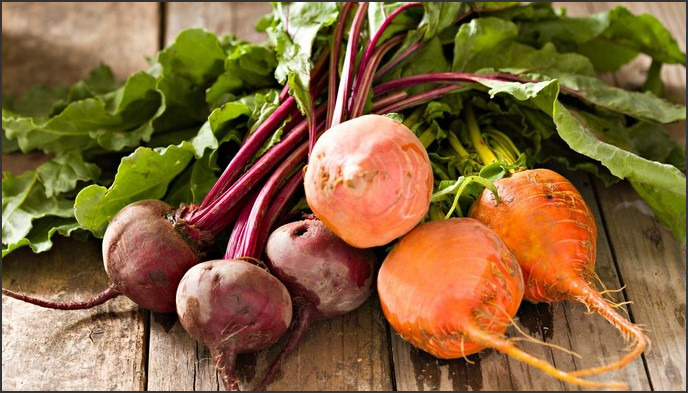Farming Beetroot: Growing Vibrant Roots for Health

Source : https://content.api.news
farming beetroot is a great way to add vibrant color and flavor to your meals. Not only is it a delicious vegetable, but it is also packed with essential vitamins and minerals that can help improve your overall health. Beetroot is a great source of dietary fiber, folate, manganese, potassium, iron, and vitamin C. It also contains nitrates, which can help lower blood pressure and improve athletic performance. With its sweet and earthy flavor, beetroot is a versatile vegetable that can be enjoyed in a variety of dishes. Whether you’re growing it in your garden or buying it from the store, farming beetroot is a great way to add nutrition and flavor to your meals.
How to Plant and Care for Beetroot: A Guide for Beginner Farmers
Beetroot is a nutritious and delicious vegetable that is easy to grow and care for. Whether you are a beginner farmer or an experienced gardener, this guide will provide you with the information you need to successfully plant and care for your beetroot crop.
Planting Beetroot
Beetroot is best planted in the early spring, when the soil is still cool and moist. Choose a sunny spot in your garden that has well-draining soil. If your soil is heavy or clay-like, mix in some compost or other organic matter to improve drainage.
Sow the beetroot seeds directly into the soil, spacing them about 2 inches apart. Cover the seeds with a thin layer of soil and water them gently. Keep the soil moist until the seedlings emerge, which should take about a week.
Caring for Beetroot
Once the seedlings have emerged, thin them out so that the plants are spaced about 4 inches apart. This will give them enough room to grow and develop.
Beetroot needs plenty of water to grow, so make sure to water your plants regularly. If the soil is dry, give them a deep watering.
Fertilize your beetroot plants every few weeks with a balanced fertilizer. This will help them to grow and produce healthy, tasty roots.
Harvesting Beetroot
Beetroot is ready to harvest when the roots are about 2 inches in diameter. Pull the roots out of the ground gently and use a sharp knife to cut off the leaves.
Beetroot can be stored in the refrigerator for up to a week. If you want to store them for longer, you can pickle them or freeze them.
With the right care and attention, you can enjoy a delicious crop of beetroot in no time. Follow these steps and you’ll be harvesting your own beetroot in no time.
The Benefits of Eating Beetroot: A Look at the Nutritional Value of This Superfood
Beetroot is a superfood that is gaining popularity due to its many health benefits. This root vegetable is packed with essential vitamins and minerals, making it an excellent addition to any diet. In this article, we will explore the nutritional value of beetroot and the many benefits it can provide.
Beetroot is an excellent source of vitamins and minerals. It is rich in vitamin C, folate, potassium, magnesium, and iron. It also contains a variety of antioxidants, which can help protect the body from free radical damage. Additionally, beetroot is a good source of dietary fiber, which can help to promote digestive health.
Beetroot is also known for its ability to lower blood pressure. Studies have shown that consuming beetroot can help to reduce systolic and diastolic blood pressure. This is due to the high levels of nitrates found in beetroot, which are converted into nitric oxide in the body. Nitric oxide helps to relax and widen the blood vessels, allowing for improved blood flow.
Beetroot is also beneficial for heart health. Studies have shown that consuming beetroot can help to reduce cholesterol levels and improve overall cardiovascular health. Additionally, beetroot can help to reduce inflammation, which can help to reduce the risk of heart disease.
Finally, beetroot is a great source of energy. It contains natural sugars, which can provide a quick boost of energy. Additionally, the nitrates found in beetroot can help to improve athletic performance.
In conclusion, beetroot is an incredibly nutritious superfood that can provide a variety of health benefits. It is rich in vitamins and minerals, and can help to reduce blood pressure, improve heart health, and provide a boost of energy. For these reasons, it is an excellent addition to any diet.
Conclusion
farming beetroot is a great way to add vibrant color and flavor to your meals while also providing a wealth of health benefits. Beetroot is a nutrient-dense vegetable that is high in fiber, vitamins, and minerals. It is also a great source of antioxidants and can help reduce inflammation. With its sweet and earthy flavor, beetroot is a versatile vegetable that can be enjoyed in a variety of dishes. Whether you are looking to add a splash of color to your plate or to reap the health benefits of this superfood, farming beetroot is a great way to do so.





